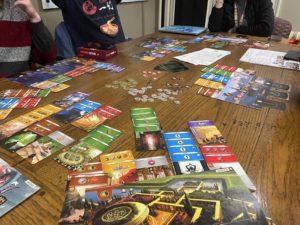7 Wonders is the board game I learned most recently. At first, I was overwhelmed by the complexity of the rules, as everyone on the table spent 20-30 minutes trying to understand the immense overhead through a combination of the instructions, one person who knew how to play, and a third-party explainer video from YouTube. Although 7 Wonders has a theme centered around ancient civilizations, we found that the fantasy aesthetic of the game was weak due to the disconnect between the goal of the game (to score points) and the theme (becoming a dominant/thriving civilization). More core to the game are the aesthetics of challenge and expression. While you are competing with your neighbors to win points from combat, you are also relying on them to trade with them for their resources, meaning you must find a balance between cooperating and competing. Furthermore, winning can come from a number of different playstyles, whether it is investing in science, war, trading, or some combination thereof, allowing for players to express their preferred style of governance over their civilization.
The most interesting mechanic, however, was the use of simultaneous turns. I am a fan of strategy games, most of which suffer from being too long (e.g. Risk, Catan). With Catan especially, I feel as if I am sitting there doing nothing for most of the game. While I get resources on other people’s turns, I do not need to be engaged with the game at all while it is someone else’s turn, unless they have expressed interest in trading. In 7 Wonders, however, it feels like we are playing 90 minutes of Catan in just 30 minutes. On every turn, everyone is doing something meaningful to progress their own civilization. At the same time, it is not an individual game, as our actions have impact on others in the game.
While 7 Wonders fixes this important issue of strategy games, it suffers heavily from another: too many rules. The huge learning curve of the game makes it very unfriendly towards beginners, with many people potentially giving up on the game before we even start. Another aspect I have found is that 7 Wonders may fall victim is slightly too much luck. Early decisions have varying levels of impact based almost purely on the cards you have access to in the future. While you can strategize to some degree based on the playstyles of those around you, your final set of cards would have gone through the hands of almost everyone at the table – how do you strategize for that amount of randomness when everyone’s preferences for what to build is a weak preference anyways.



